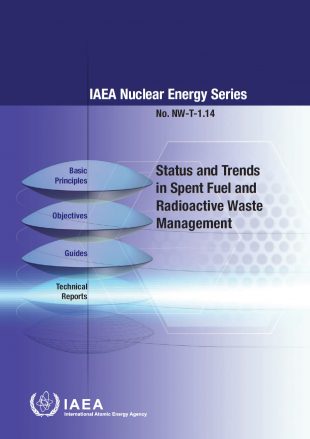
Keeping a national stock-count
Keeping a stock-count of the world’s radioactive waste is the responsibility of individual countries. However, until recently, there has been no authoritative publication that systematically and periodically summarises the global status and trends of inventories and programmes for spent fuel and radioactive waste management.
The UK updates its own comprehensive inventory every 3 years and the various sets of inventory data are reported to a range of international organisations, as required. The UK reports to the International Atomic Energy Agency, the European Commission and the Organisation for Economic Co-operation and Development’s Nuclear Energy Agency.
Working together
A few years ago, these organisations set up a collaborative working group with the aim of producing an authoritative publication that gives a global systematic overview of developments in managing radioactive waste and spent fuel. The intention is to update and refine it periodically (roughly every three years).
I’ve now attended 2 of the ‘Status and Trends in Radioactive Waste and Spent Fuel Management’ working group sessions. For me, they were fantastic opportunities to join with experts from across the world in developing an important publication. The meetings also facilitate the sharing of the good work that we’re undertaking here in the UK, and a chance to see what learning we can take from other countries.
First collaborative report
At my initial meeting about a year ago, the first report was just about finalised and has since been published. It contains data for approximately 80% of states with operating nuclear power plants, representing almost 95% of all nuclear power reactors in the world. Further improvement in the extent of data coverage and an increasing focus on future waste arisings and on trends in management practices are expected in future editions of the report.

The report also addresses:
- the institutional, legal and regulatory frameworks for the management of spent fuel and radioactive waste
- spent fuel and radioactive waste management programmes
- current practices and technologies
- spent fuel and radioactive waste inventories and forecasts
At that initial meeting, we also focused on preparations for the second iteration – in particular, what should its scope and objectives be.
Preparing the next one
In the second meeting, we reviewed feedback on the first report, which has been positive, and we focused on developing the next iteration, which will include up-to date information, analysis and developing trends.
There was a lively discussion on the various issues and plenty of ideas generated for the steering group to take away and integrate into the second report. Overall, attendance at the working group was a positive experience and it’s a pleasure to work with so many enthusiastic people.
The UK's next update
Here in the UK, compiling and improving the inventory is an active, ongoing work area. The UK Inventory is updated regularly and contains information on all wastes that are present in the UK and that are expected to arise from existing facilities.
The UK Inventory is a source of important information for the government, waste producers, our own work, and the decommissioning activities of our Site Licence Companies.
Alongside the Department for Business, Energy and Industrial Strategy (BEIS), we’re currently carrying out preparatory work to deliver the 2019 UK Inventory and have just updated our strategy for the management of inventory data.
Further information
The UK Inventory webpage contains comprehensive information on the UK's radioactive waste and forecasts of future quantities.
Recent Comments